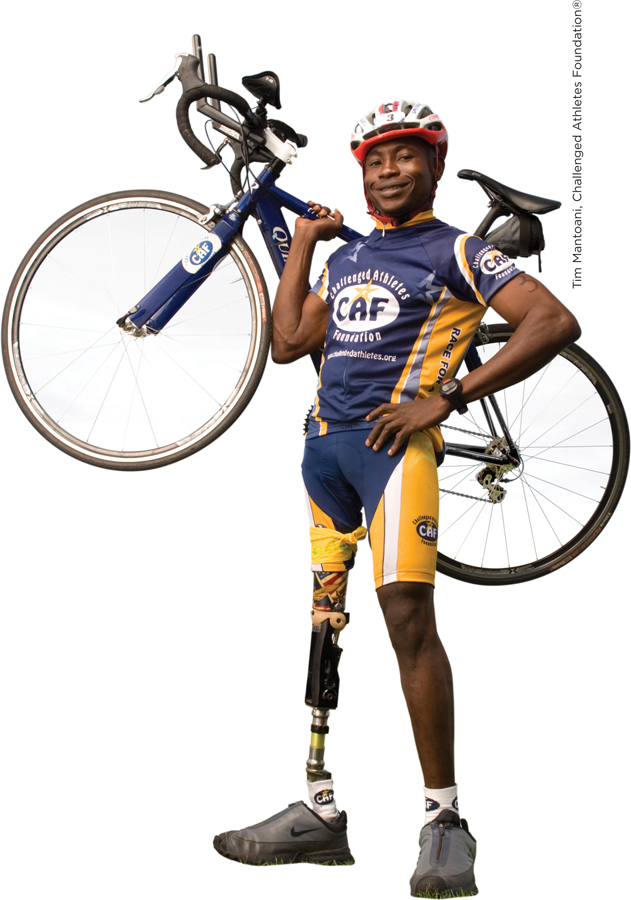Chapter 11 Introduction
456
Motivation 11

457
CHAPTER OUTLINE
The Variety of Motives
Biological Needs and Motivation
Hunger and Eating
Sexual Desire
Achievement Needs
The Need to Achieve
The Need to Avoid Failure
Social Needs
Belonging
Understanding
Control
Enhancing the Self
Trust
THIS JUST IN: Oxytocin and Individual Differences
Cognition and Motivation
Goals
Implementation Intentions
Making the Distant Future Motivating
Motivational Orientations
CULTURAL OPPORTUNITIES: Choice and Motivation
RESEARCH TOOLKIT: Experience Sampling Methods
Motivation in Groups
Social Facilitation
Motivation in Schools
Motivation at Work
Motivation and the Brain
Approach, Avoidance, and the Brain
Addiction and the Brain
Goals and the Brain
Looking Back and Looking Ahead
DO YOU EVER FEEL UNMOTIVATED? YOU MIGHT know that you should be getting more exercise—
If this describes you, you’re not alone. Many people have trouble motivating themselves. But not everybody. One day in 2002, a 24-
His trip took months, but he finished it—
Mr. Yeboah motivated himself into action despite obstacles that, to others, might have been excuses for inaction:
Childhood presented the first obstacle to bike riding: His family couldn’t afford a bike. The first time he was able to ride one was by taking some change his mother had given him for lunch and spending it on a bike rental instead.
In adulthood, Mr. Yeboah still couldn’t afford a bike; his job as a shoe shiner gave him little spare income. The bike he rode across Ghana was donated by a charitable organization.
The same charitable organization also supported Mr. Yeboah’s trip to San Diego. Yet the trip still wasn’t easy: When he arrived, on his first trip outside of Ghana, he had with him only three dollars.
But these obstacles were the small ones. The big one? Mr. Yeboah could only pedal his bike with one leg! His right leg had been deformed from birth—
Mr. Yeboah’s motivation was deeply rooted. He knew that, in Ghana, physically challenged people like himself were treated poorly; they were seen as incapable of contributing positively to society. “I want,” he explained, “to show everyone that physically challenged people can do something” (Coffey, 2005).

458
This he did. Mr. Yeboah’s ability to overcome challenges made him a hero in his nation. Rather than basking in personal glory, though, he next directed his efforts to helping others. In Ghana, he established athletic training facilities that are open to all people, and he worked with government officials to improve the civil rights and personal opportunities of physically challenged individuals.
What were the sources of Mr. Yeboah’s motivation? A deeply felt need to improve the welfare of others. Concrete goals and a determination to reach them. And this belief: “There’s something always I believe myself,” Yeboah said, “that I can do it, I can do it” (ABC News, 2005).
We explore these sources of motivation in the chapter ahead. ![]()
LET’S BEGIN THIS chapter by assessing the field of psychology. From what you’ve learned so far, do you think psychology is succeeding? Providing scientific explanations of what you would want a science of psychology to explain? Or is it falling short?
One well-
But you do know better. When you observe people, they usually are not just thinking and feeling, but doing. They are at work or play, studying, exercising, talking, driving, reading, or updating their Facebook pages. People are in action. They are motivated. Motivation refers to the psychological and biological processes that impel people, and other organisms, into action and sustain their efforts over time. This chapter introduces you to the psychology of motivation.